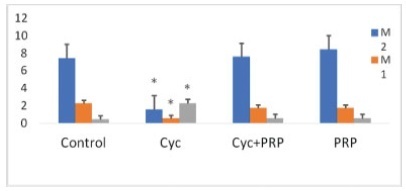-
Original Article04-08-2022
Protective Effects of Platelet-rich plasma for in vitro Fertilization of Rats with Ovarian Failure Induced by Cyclophosphamide
Revista Brasileira de Ginecologia e Obstetrícia. 2022;44(2):161-168
Abstract
Original ArticleProtective Effects of Platelet-rich plasma for in vitro Fertilization of Rats with Ovarian Failure Induced by Cyclophosphamide
Revista Brasileira de Ginecologia e Obstetrícia. 2022;44(2):161-168
Views210Abstract
Objective
Premature ovarian insufficiency (POI) contributes significantly to female infertility. Cyclophosphamide (CYC has adverse effects on folliculogenesis. Platelet-rich plasma (PRP) is an autologous product rich in many growth factors. We evaluated the protective effect of PRP on in vitro fertilization in female rats with CYC-induced ovarian damage.
Methods
Twenty-eight adult female Sprague-Dawley rats were randomly divided into four groups. Group 1 (control-sodium chloride 0.9%; 1 mL/kg, single-dose intraperitoneal [IP] injection); group 2 (CYC), 75mg/kg, single-dose IP injection and sodium chloride 0.9% (1mL/kg, single-dose IP injection); group 3 CYC plus PRP, CYC (75 mg/kg, single-dose and PRP (200 μl, single-dose) IP injection); and group 4 (PRP, 200 μl, singledose IP injection).
Results
In the comparisons in terms of M1 and M2 oocytes, it was observed that the CYC group presented a significantly lower amount than the control, CYC/PRP, and PRP groups. (for M1, p=0.000, p=0.029, p=0.025; for M2, p=0.009, p=0.004, p=0.000, respectively). The number of fertilized oocytes and two-celled good quality embryos was found to be statistically significant between the CYC and control groups, CYC+PRP and PRP groups (p=0.009, p=0.001, p=0.000 for oocytes, respectively. For embryos; p=0.016, p=0.002, p=0.000).
Conclusion
Platelet-rich plasma can protect the ovarian function against damage caused by CYC, and, in addition, it improves oocyte count and the development of embryos as a result of oocyte stimulation during the IVF procedure.
Key-words CyclophosphamideIn vitro fertilizationOvaryplatelet-rich plasmapremature ovarian insufficiencySee more
-
Original Article02-01-2018
Influence of Sexual Function on the Social Relations and Quality of Life of Women with Premature Ovarian Insufficiency
Revista Brasileira de Ginecologia e Obstetrícia. 2018;40(2):66-71
Abstract
Original ArticleInfluence of Sexual Function on the Social Relations and Quality of Life of Women with Premature Ovarian Insufficiency
Revista Brasileira de Ginecologia e Obstetrícia. 2018;40(2):66-71
Views172See moreAbstract
Objective
To evaluate the impact of sexual function (SF) in the quality of life (QoL) of women with premature ovarian insufficiency (POI).
Methods
Case-control study in which 80women with POIwere evaluated using estrogen plus progestogen therapy, compared with 80 women matched by age (2 years) and presenting preserved gonadal function. Sexual function was evaluated using the Female Sexual Function Index (FSFI), and the QoL was evaluated using theWorld Health Organization's (WHO) QoL assessment instrument (WHOQoL-BREF).
Results
The mean age of the women with POI and of the control group was 38.4 ± 7.3 years and 38.1 ± 7.3 years respectively. The QoL, was worse among the POI group, and there were significant differences in the physical (63.4 ± 17.4 and 72.7 ± 15.2 respectively, p = 0.0004) and psychological (63.2 ± 14.6 and 69.3 ± 13.9 respectively, p = 0.0075) domains among this group when compared with the control group. Women with POI presented significantly lower arousal, lubrication, orgasm and satisfaction, more dyspareunia and a worse FSFI scores when compared with the control group. All aspects of SF correlate directly with the worsening of the QoL regarding social relationships.
Conclusion
Women with POI showed worse QoL and SF than the control group. The psychological aspects (desire, excitement, orgasm and sexual satisfaction) of SF had greater influence on the parameters of the QoL, while the physical aspects (pain and lubrication) had a low impact on the QoL. The poor SF in women with POI is directly correlated with a worsening acrossmultiple domains of the QoL; however, the negative impact is particularly important in the social domain. These results suggest that the improvement in sexuality can improve the social interactions of women with POI.


